Comprehensive Report: Healthcare Quality Improvement in Berkshire NHS
VerifiedAdded on 2020/01/28
|12
|4021
|48
Report
AI Summary
This report focuses on improving the quality of healthcare services provided by Berkshire Healthcare NHS Foundation Trust. It begins with an introduction to clinical governance, emphasizing its role in enhancing patient care and reducing mortality rates. The report then delves into the background, identifying key factors influencing healthcare quality, such as inappropriate surgical procedures, nosocomial infections, and financial constraints. Data analysis, including SWOT analysis, reveals strengths, weaknesses, opportunities, and threats within the trust. The report highlights issues like medication errors, lack of proper clinical assistance, and communication problems. To address these challenges, the report suggests implementing Total Quality Management (TQM) and change management strategies. The report also discusses Lewin’s force-field analysis as a tool for decision-making. The goal is to improve patient safety and the overall quality of care by addressing the root causes of failures and implementing effective solutions.
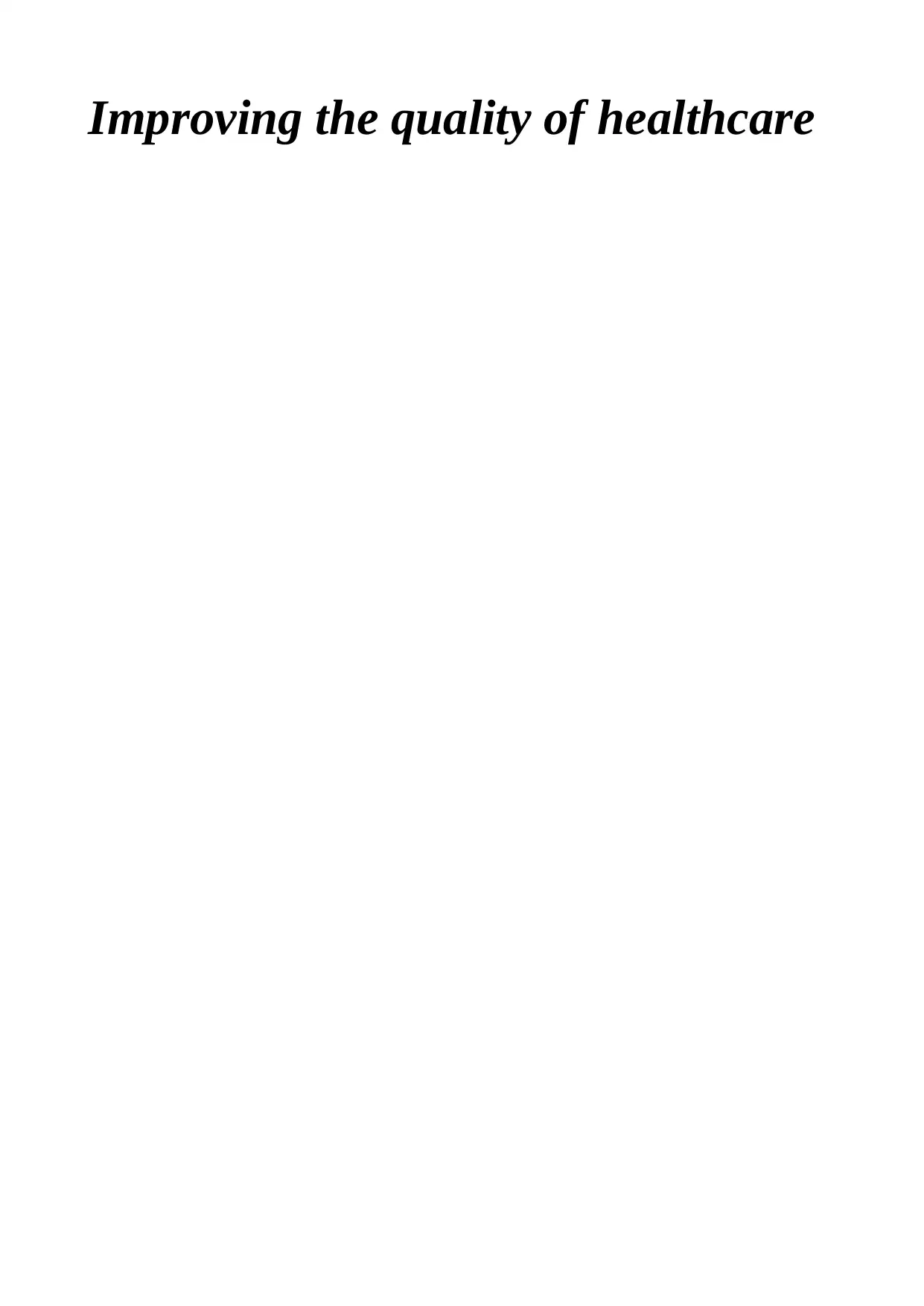
Improving the quality of healthcare
Paraphrase This Document
Need a fresh take? Get an instant paraphrase of this document with our AI Paraphraser
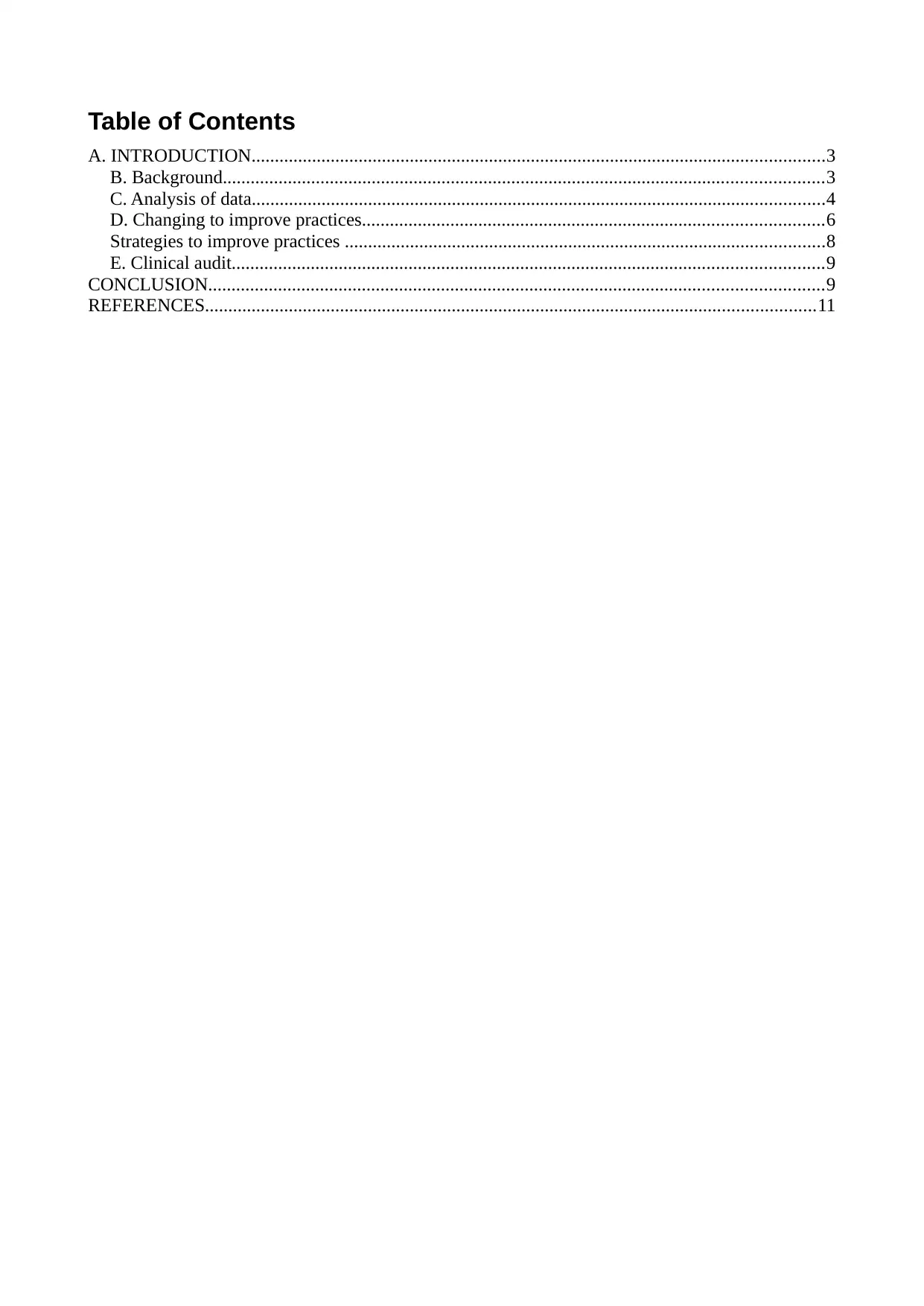
Table of Contents
A. INTRODUCTION...........................................................................................................................3
B. Background.................................................................................................................................3
C. Analysis of data...........................................................................................................................4
D. Changing to improve practices...................................................................................................6
Strategies to improve practices .......................................................................................................8
E. Clinical audit...............................................................................................................................9
CONCLUSION....................................................................................................................................9
REFERENCES...................................................................................................................................11
A. INTRODUCTION...........................................................................................................................3
B. Background.................................................................................................................................3
C. Analysis of data...........................................................................................................................4
D. Changing to improve practices...................................................................................................6
Strategies to improve practices .......................................................................................................8
E. Clinical audit...............................................................................................................................9
CONCLUSION....................................................................................................................................9
REFERENCES...................................................................................................................................11
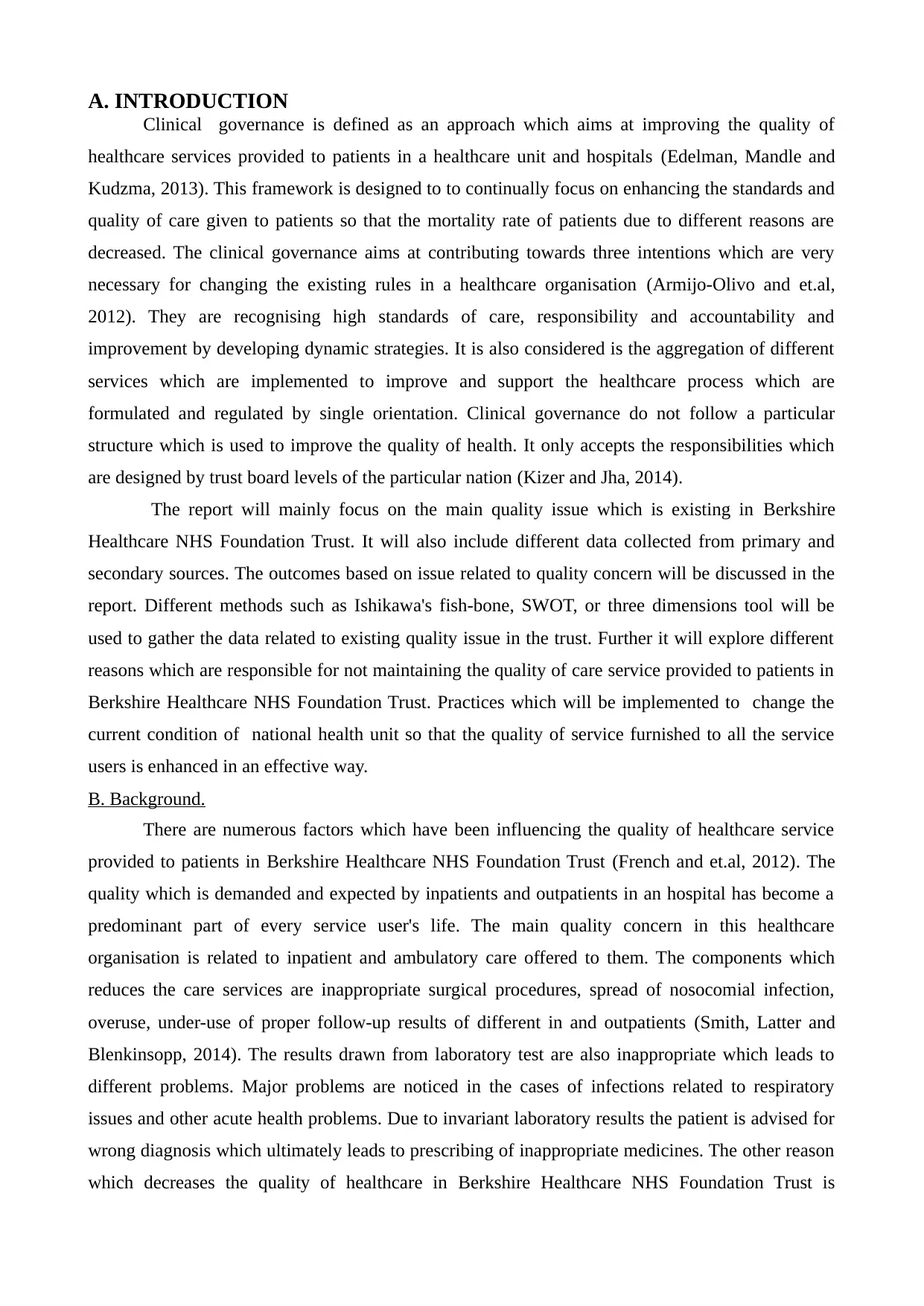
A. INTRODUCTION
Clinical governance is defined as an approach which aims at improving the quality of
healthcare services provided to patients in a healthcare unit and hospitals (Edelman, Mandle and
Kudzma, 2013). This framework is designed to to continually focus on enhancing the standards and
quality of care given to patients so that the mortality rate of patients due to different reasons are
decreased. The clinical governance aims at contributing towards three intentions which are very
necessary for changing the existing rules in a healthcare organisation (Armijo‐Olivo and et.al,
2012). They are recognising high standards of care, responsibility and accountability and
improvement by developing dynamic strategies. It is also considered is the aggregation of different
services which are implemented to improve and support the healthcare process which are
formulated and regulated by single orientation. Clinical governance do not follow a particular
structure which is used to improve the quality of health. It only accepts the responsibilities which
are designed by trust board levels of the particular nation (Kizer and Jha, 2014).
The report will mainly focus on the main quality issue which is existing in Berkshire
Healthcare NHS Foundation Trust. It will also include different data collected from primary and
secondary sources. The outcomes based on issue related to quality concern will be discussed in the
report. Different methods such as Ishikawa's fish-bone, SWOT, or three dimensions tool will be
used to gather the data related to existing quality issue in the trust. Further it will explore different
reasons which are responsible for not maintaining the quality of care service provided to patients in
Berkshire Healthcare NHS Foundation Trust. Practices which will be implemented to change the
current condition of national health unit so that the quality of service furnished to all the service
users is enhanced in an effective way.
B. Background.
There are numerous factors which have been influencing the quality of healthcare service
provided to patients in Berkshire Healthcare NHS Foundation Trust (French and et.al, 2012). The
quality which is demanded and expected by inpatients and outpatients in an hospital has become a
predominant part of every service user's life. The main quality concern in this healthcare
organisation is related to inpatient and ambulatory care offered to them. The components which
reduces the care services are inappropriate surgical procedures, spread of nosocomial infection,
overuse, under-use of proper follow-up results of different in and outpatients (Smith, Latter and
Blenkinsopp, 2014). The results drawn from laboratory test are also inappropriate which leads to
different problems. Major problems are noticed in the cases of infections related to respiratory
issues and other acute health problems. Due to invariant laboratory results the patient is advised for
wrong diagnosis which ultimately leads to prescribing of inappropriate medicines. The other reason
which decreases the quality of healthcare in Berkshire Healthcare NHS Foundation Trust is
Clinical governance is defined as an approach which aims at improving the quality of
healthcare services provided to patients in a healthcare unit and hospitals (Edelman, Mandle and
Kudzma, 2013). This framework is designed to to continually focus on enhancing the standards and
quality of care given to patients so that the mortality rate of patients due to different reasons are
decreased. The clinical governance aims at contributing towards three intentions which are very
necessary for changing the existing rules in a healthcare organisation (Armijo‐Olivo and et.al,
2012). They are recognising high standards of care, responsibility and accountability and
improvement by developing dynamic strategies. It is also considered is the aggregation of different
services which are implemented to improve and support the healthcare process which are
formulated and regulated by single orientation. Clinical governance do not follow a particular
structure which is used to improve the quality of health. It only accepts the responsibilities which
are designed by trust board levels of the particular nation (Kizer and Jha, 2014).
The report will mainly focus on the main quality issue which is existing in Berkshire
Healthcare NHS Foundation Trust. It will also include different data collected from primary and
secondary sources. The outcomes based on issue related to quality concern will be discussed in the
report. Different methods such as Ishikawa's fish-bone, SWOT, or three dimensions tool will be
used to gather the data related to existing quality issue in the trust. Further it will explore different
reasons which are responsible for not maintaining the quality of care service provided to patients in
Berkshire Healthcare NHS Foundation Trust. Practices which will be implemented to change the
current condition of national health unit so that the quality of service furnished to all the service
users is enhanced in an effective way.
B. Background.
There are numerous factors which have been influencing the quality of healthcare service
provided to patients in Berkshire Healthcare NHS Foundation Trust (French and et.al, 2012). The
quality which is demanded and expected by inpatients and outpatients in an hospital has become a
predominant part of every service user's life. The main quality concern in this healthcare
organisation is related to inpatient and ambulatory care offered to them. The components which
reduces the care services are inappropriate surgical procedures, spread of nosocomial infection,
overuse, under-use of proper follow-up results of different in and outpatients (Smith, Latter and
Blenkinsopp, 2014). The results drawn from laboratory test are also inappropriate which leads to
different problems. Major problems are noticed in the cases of infections related to respiratory
issues and other acute health problems. Due to invariant laboratory results the patient is advised for
wrong diagnosis which ultimately leads to prescribing of inappropriate medicines. The other reason
which decreases the quality of healthcare in Berkshire Healthcare NHS Foundation Trust is
⊘ This is a preview!⊘
Do you want full access?
Subscribe today to unlock all pages.

Trusted by 1+ million students worldwide
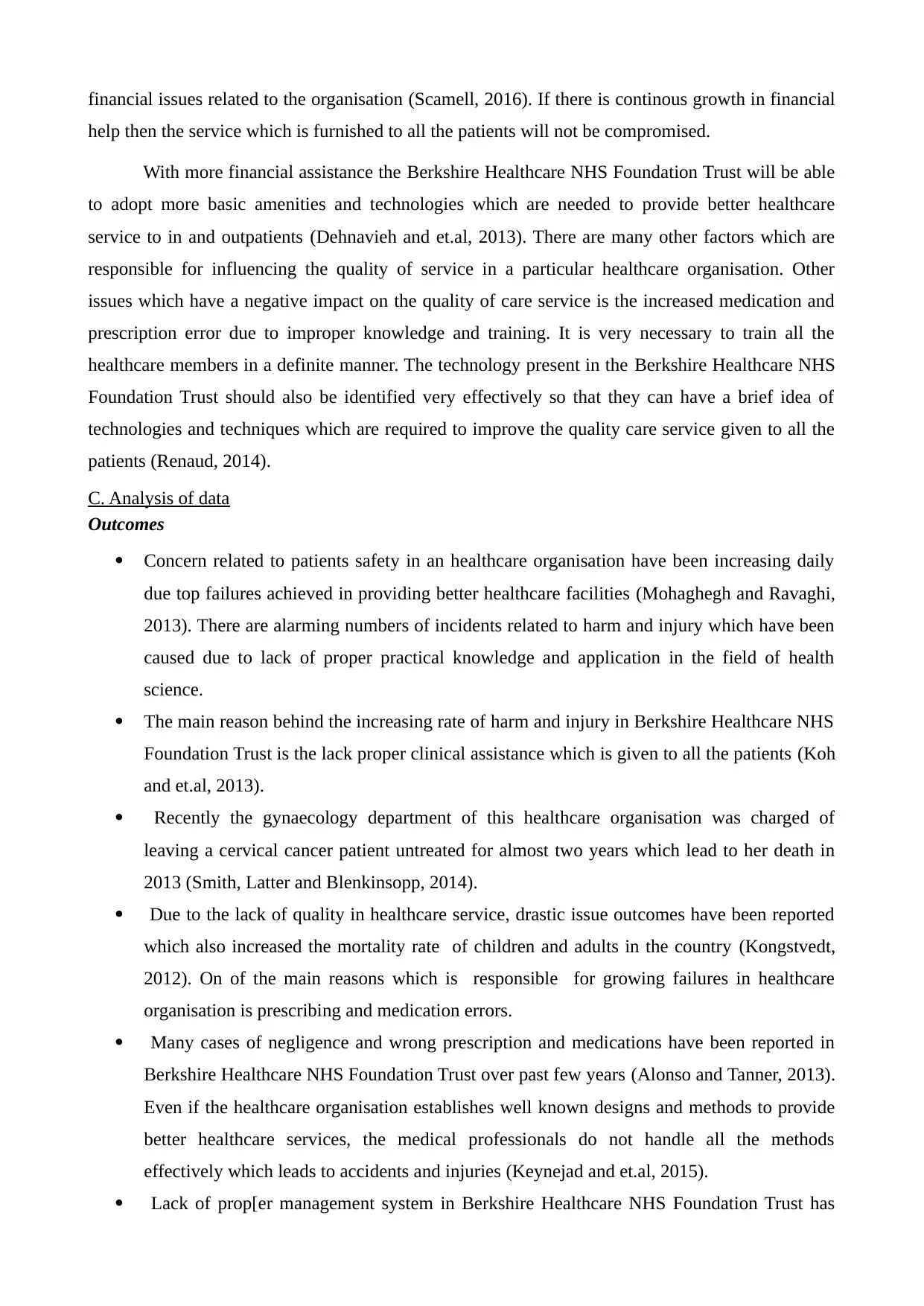
financial issues related to the organisation (Scamell, 2016). If there is continous growth in financial
help then the service which is furnished to all the patients will not be compromised.
With more financial assistance the Berkshire Healthcare NHS Foundation Trust will be able
to adopt more basic amenities and technologies which are needed to provide better healthcare
service to in and outpatients (Dehnavieh and et.al, 2013). There are many other factors which are
responsible for influencing the quality of service in a particular healthcare organisation. Other
issues which have a negative impact on the quality of care service is the increased medication and
prescription error due to improper knowledge and training. It is very necessary to train all the
healthcare members in a definite manner. The technology present in the Berkshire Healthcare NHS
Foundation Trust should also be identified very effectively so that they can have a brief idea of
technologies and techniques which are required to improve the quality care service given to all the
patients (Renaud, 2014).
C. Analysis of data
Outcomes
Concern related to patients safety in an healthcare organisation have been increasing daily
due top failures achieved in providing better healthcare facilities (Mohaghegh and Ravaghi,
2013). There are alarming numbers of incidents related to harm and injury which have been
caused due to lack of proper practical knowledge and application in the field of health
science.
The main reason behind the increasing rate of harm and injury in Berkshire Healthcare NHS
Foundation Trust is the lack proper clinical assistance which is given to all the patients (Koh
and et.al, 2013).
Recently the gynaecology department of this healthcare organisation was charged of
leaving a cervical cancer patient untreated for almost two years which lead to her death in
2013 (Smith, Latter and Blenkinsopp, 2014).
Due to the lack of quality in healthcare service, drastic issue outcomes have been reported
which also increased the mortality rate of children and adults in the country (Kongstvedt,
2012). On of the main reasons which is responsible for growing failures in healthcare
organisation is prescribing and medication errors.
Many cases of negligence and wrong prescription and medications have been reported in
Berkshire Healthcare NHS Foundation Trust over past few years (Alonso and Tanner, 2013).
Even if the healthcare organisation establishes well known designs and methods to provide
better healthcare services, the medical professionals do not handle all the methods
effectively which leads to accidents and injuries (Keynejad and et.al, 2015).
Lack of prop[er management system in Berkshire Healthcare NHS Foundation Trust has
help then the service which is furnished to all the patients will not be compromised.
With more financial assistance the Berkshire Healthcare NHS Foundation Trust will be able
to adopt more basic amenities and technologies which are needed to provide better healthcare
service to in and outpatients (Dehnavieh and et.al, 2013). There are many other factors which are
responsible for influencing the quality of service in a particular healthcare organisation. Other
issues which have a negative impact on the quality of care service is the increased medication and
prescription error due to improper knowledge and training. It is very necessary to train all the
healthcare members in a definite manner. The technology present in the Berkshire Healthcare NHS
Foundation Trust should also be identified very effectively so that they can have a brief idea of
technologies and techniques which are required to improve the quality care service given to all the
patients (Renaud, 2014).
C. Analysis of data
Outcomes
Concern related to patients safety in an healthcare organisation have been increasing daily
due top failures achieved in providing better healthcare facilities (Mohaghegh and Ravaghi,
2013). There are alarming numbers of incidents related to harm and injury which have been
caused due to lack of proper practical knowledge and application in the field of health
science.
The main reason behind the increasing rate of harm and injury in Berkshire Healthcare NHS
Foundation Trust is the lack proper clinical assistance which is given to all the patients (Koh
and et.al, 2013).
Recently the gynaecology department of this healthcare organisation was charged of
leaving a cervical cancer patient untreated for almost two years which lead to her death in
2013 (Smith, Latter and Blenkinsopp, 2014).
Due to the lack of quality in healthcare service, drastic issue outcomes have been reported
which also increased the mortality rate of children and adults in the country (Kongstvedt,
2012). On of the main reasons which is responsible for growing failures in healthcare
organisation is prescribing and medication errors.
Many cases of negligence and wrong prescription and medications have been reported in
Berkshire Healthcare NHS Foundation Trust over past few years (Alonso and Tanner, 2013).
Even if the healthcare organisation establishes well known designs and methods to provide
better healthcare services, the medical professionals do not handle all the methods
effectively which leads to accidents and injuries (Keynejad and et.al, 2015).
Lack of prop[er management system in Berkshire Healthcare NHS Foundation Trust has
Paraphrase This Document
Need a fresh take? Get an instant paraphrase of this document with our AI Paraphraser
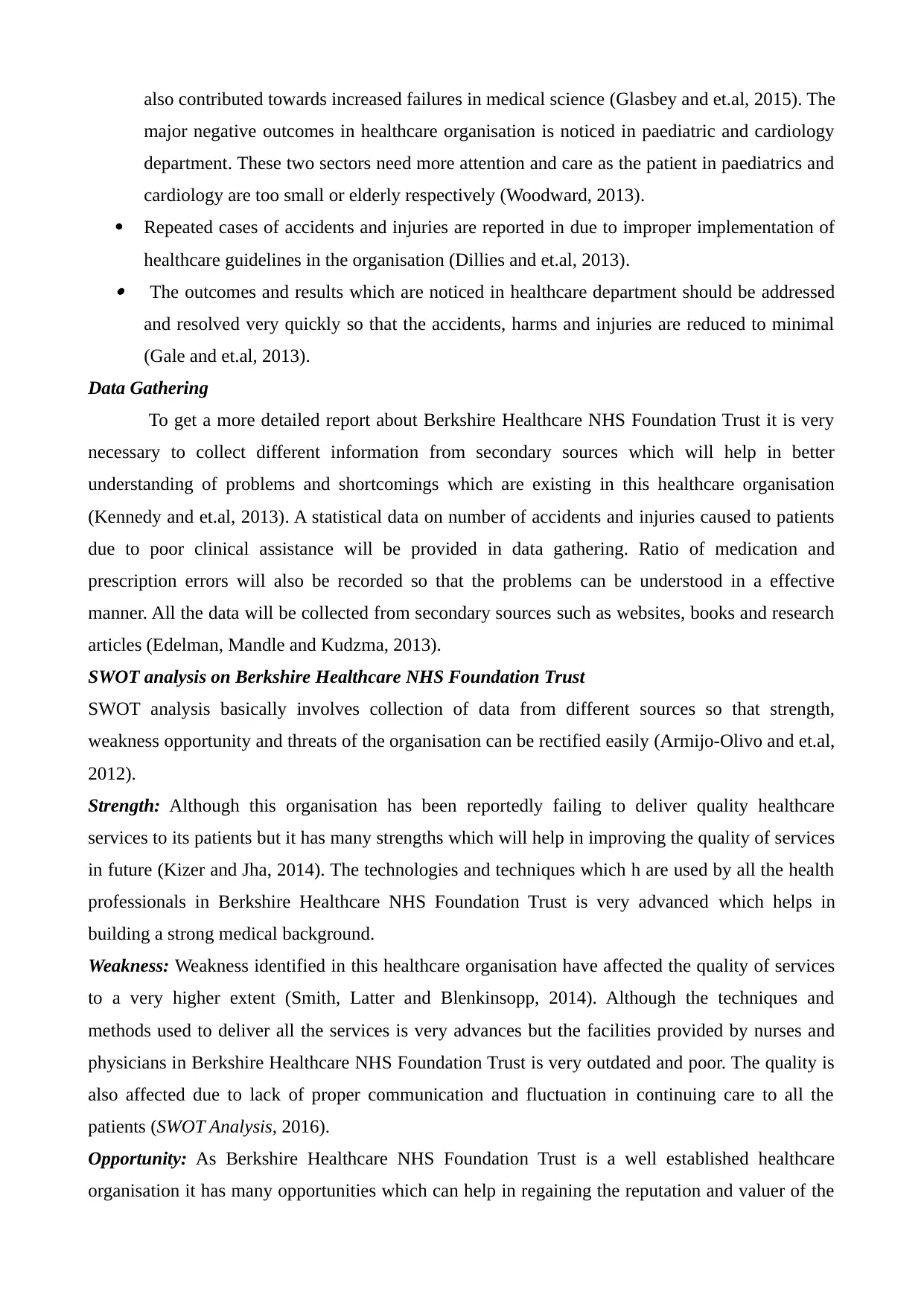
also contributed towards increased failures in medical science (Glasbey and et.al, 2015). The
major negative outcomes in healthcare organisation is noticed in paediatric and cardiology
department. These two sectors need more attention and care as the patient in paediatrics and
cardiology are too small or elderly respectively (Woodward, 2013).
Repeated cases of accidents and injuries are reported in due to improper implementation of
healthcare guidelines in the organisation (Dillies and et.al, 2013). The outcomes and results which are noticed in healthcare department should be addressed
and resolved very quickly so that the accidents, harms and injuries are reduced to minimal
(Gale and et.al, 2013).
Data Gathering
To get a more detailed report about Berkshire Healthcare NHS Foundation Trust it is very
necessary to collect different information from secondary sources which will help in better
understanding of problems and shortcomings which are existing in this healthcare organisation
(Kennedy and et.al, 2013). A statistical data on number of accidents and injuries caused to patients
due to poor clinical assistance will be provided in data gathering. Ratio of medication and
prescription errors will also be recorded so that the problems can be understood in a effective
manner. All the data will be collected from secondary sources such as websites, books and research
articles (Edelman, Mandle and Kudzma, 2013).
SWOT analysis on Berkshire Healthcare NHS Foundation Trust
SWOT analysis basically involves collection of data from different sources so that strength,
weakness opportunity and threats of the organisation can be rectified easily (Armijo‐Olivo and et.al,
2012).
Strength: Although this organisation has been reportedly failing to deliver quality healthcare
services to its patients but it has many strengths which will help in improving the quality of services
in future (Kizer and Jha, 2014). The technologies and techniques which h are used by all the health
professionals in Berkshire Healthcare NHS Foundation Trust is very advanced which helps in
building a strong medical background.
Weakness: Weakness identified in this healthcare organisation have affected the quality of services
to a very higher extent (Smith, Latter and Blenkinsopp, 2014). Although the techniques and
methods used to deliver all the services is very advances but the facilities provided by nurses and
physicians in Berkshire Healthcare NHS Foundation Trust is very outdated and poor. The quality is
also affected due to lack of proper communication and fluctuation in continuing care to all the
patients (SWOT Analysis, 2016).
Opportunity: As Berkshire Healthcare NHS Foundation Trust is a well established healthcare
organisation it has many opportunities which can help in regaining the reputation and valuer of the
major negative outcomes in healthcare organisation is noticed in paediatric and cardiology
department. These two sectors need more attention and care as the patient in paediatrics and
cardiology are too small or elderly respectively (Woodward, 2013).
Repeated cases of accidents and injuries are reported in due to improper implementation of
healthcare guidelines in the organisation (Dillies and et.al, 2013). The outcomes and results which are noticed in healthcare department should be addressed
and resolved very quickly so that the accidents, harms and injuries are reduced to minimal
(Gale and et.al, 2013).
Data Gathering
To get a more detailed report about Berkshire Healthcare NHS Foundation Trust it is very
necessary to collect different information from secondary sources which will help in better
understanding of problems and shortcomings which are existing in this healthcare organisation
(Kennedy and et.al, 2013). A statistical data on number of accidents and injuries caused to patients
due to poor clinical assistance will be provided in data gathering. Ratio of medication and
prescription errors will also be recorded so that the problems can be understood in a effective
manner. All the data will be collected from secondary sources such as websites, books and research
articles (Edelman, Mandle and Kudzma, 2013).
SWOT analysis on Berkshire Healthcare NHS Foundation Trust
SWOT analysis basically involves collection of data from different sources so that strength,
weakness opportunity and threats of the organisation can be rectified easily (Armijo‐Olivo and et.al,
2012).
Strength: Although this organisation has been reportedly failing to deliver quality healthcare
services to its patients but it has many strengths which will help in improving the quality of services
in future (Kizer and Jha, 2014). The technologies and techniques which h are used by all the health
professionals in Berkshire Healthcare NHS Foundation Trust is very advanced which helps in
building a strong medical background.
Weakness: Weakness identified in this healthcare organisation have affected the quality of services
to a very higher extent (Smith, Latter and Blenkinsopp, 2014). Although the techniques and
methods used to deliver all the services is very advances but the facilities provided by nurses and
physicians in Berkshire Healthcare NHS Foundation Trust is very outdated and poor. The quality is
also affected due to lack of proper communication and fluctuation in continuing care to all the
patients (SWOT Analysis, 2016).
Opportunity: As Berkshire Healthcare NHS Foundation Trust is a well established healthcare
organisation it has many opportunities which can help in regaining the reputation and valuer of the
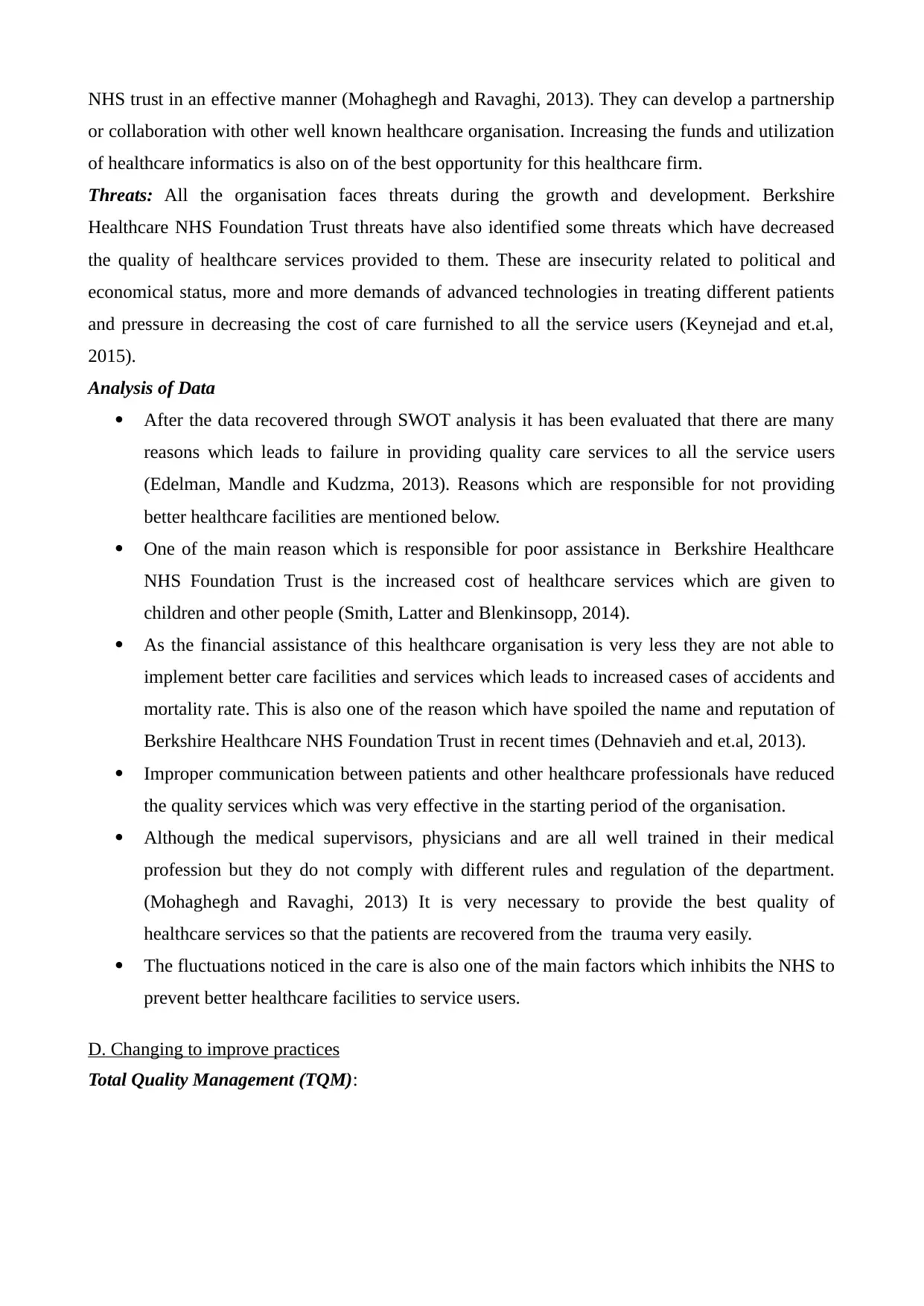
NHS trust in an effective manner (Mohaghegh and Ravaghi, 2013). They can develop a partnership
or collaboration with other well known healthcare organisation. Increasing the funds and utilization
of healthcare informatics is also on of the best opportunity for this healthcare firm.
Threats: All the organisation faces threats during the growth and development. Berkshire
Healthcare NHS Foundation Trust threats have also identified some threats which have decreased
the quality of healthcare services provided to them. These are insecurity related to political and
economical status, more and more demands of advanced technologies in treating different patients
and pressure in decreasing the cost of care furnished to all the service users (Keynejad and et.al,
2015).
Analysis of Data
After the data recovered through SWOT analysis it has been evaluated that there are many
reasons which leads to failure in providing quality care services to all the service users
(Edelman, Mandle and Kudzma, 2013). Reasons which are responsible for not providing
better healthcare facilities are mentioned below.
One of the main reason which is responsible for poor assistance in Berkshire Healthcare
NHS Foundation Trust is the increased cost of healthcare services which are given to
children and other people (Smith, Latter and Blenkinsopp, 2014).
As the financial assistance of this healthcare organisation is very less they are not able to
implement better care facilities and services which leads to increased cases of accidents and
mortality rate. This is also one of the reason which have spoiled the name and reputation of
Berkshire Healthcare NHS Foundation Trust in recent times (Dehnavieh and et.al, 2013).
Improper communication between patients and other healthcare professionals have reduced
the quality services which was very effective in the starting period of the organisation.
Although the medical supervisors, physicians and are all well trained in their medical
profession but they do not comply with different rules and regulation of the department.
(Mohaghegh and Ravaghi, 2013) It is very necessary to provide the best quality of
healthcare services so that the patients are recovered from the trauma very easily.
The fluctuations noticed in the care is also one of the main factors which inhibits the NHS to
prevent better healthcare facilities to service users.
D. Changing to improve practices
Total Quality Management (TQM):
or collaboration with other well known healthcare organisation. Increasing the funds and utilization
of healthcare informatics is also on of the best opportunity for this healthcare firm.
Threats: All the organisation faces threats during the growth and development. Berkshire
Healthcare NHS Foundation Trust threats have also identified some threats which have decreased
the quality of healthcare services provided to them. These are insecurity related to political and
economical status, more and more demands of advanced technologies in treating different patients
and pressure in decreasing the cost of care furnished to all the service users (Keynejad and et.al,
2015).
Analysis of Data
After the data recovered through SWOT analysis it has been evaluated that there are many
reasons which leads to failure in providing quality care services to all the service users
(Edelman, Mandle and Kudzma, 2013). Reasons which are responsible for not providing
better healthcare facilities are mentioned below.
One of the main reason which is responsible for poor assistance in Berkshire Healthcare
NHS Foundation Trust is the increased cost of healthcare services which are given to
children and other people (Smith, Latter and Blenkinsopp, 2014).
As the financial assistance of this healthcare organisation is very less they are not able to
implement better care facilities and services which leads to increased cases of accidents and
mortality rate. This is also one of the reason which have spoiled the name and reputation of
Berkshire Healthcare NHS Foundation Trust in recent times (Dehnavieh and et.al, 2013).
Improper communication between patients and other healthcare professionals have reduced
the quality services which was very effective in the starting period of the organisation.
Although the medical supervisors, physicians and are all well trained in their medical
profession but they do not comply with different rules and regulation of the department.
(Mohaghegh and Ravaghi, 2013) It is very necessary to provide the best quality of
healthcare services so that the patients are recovered from the trauma very easily.
The fluctuations noticed in the care is also one of the main factors which inhibits the NHS to
prevent better healthcare facilities to service users.
D. Changing to improve practices
Total Quality Management (TQM):
⊘ This is a preview!⊘
Do you want full access?
Subscribe today to unlock all pages.

Trusted by 1+ million students worldwide
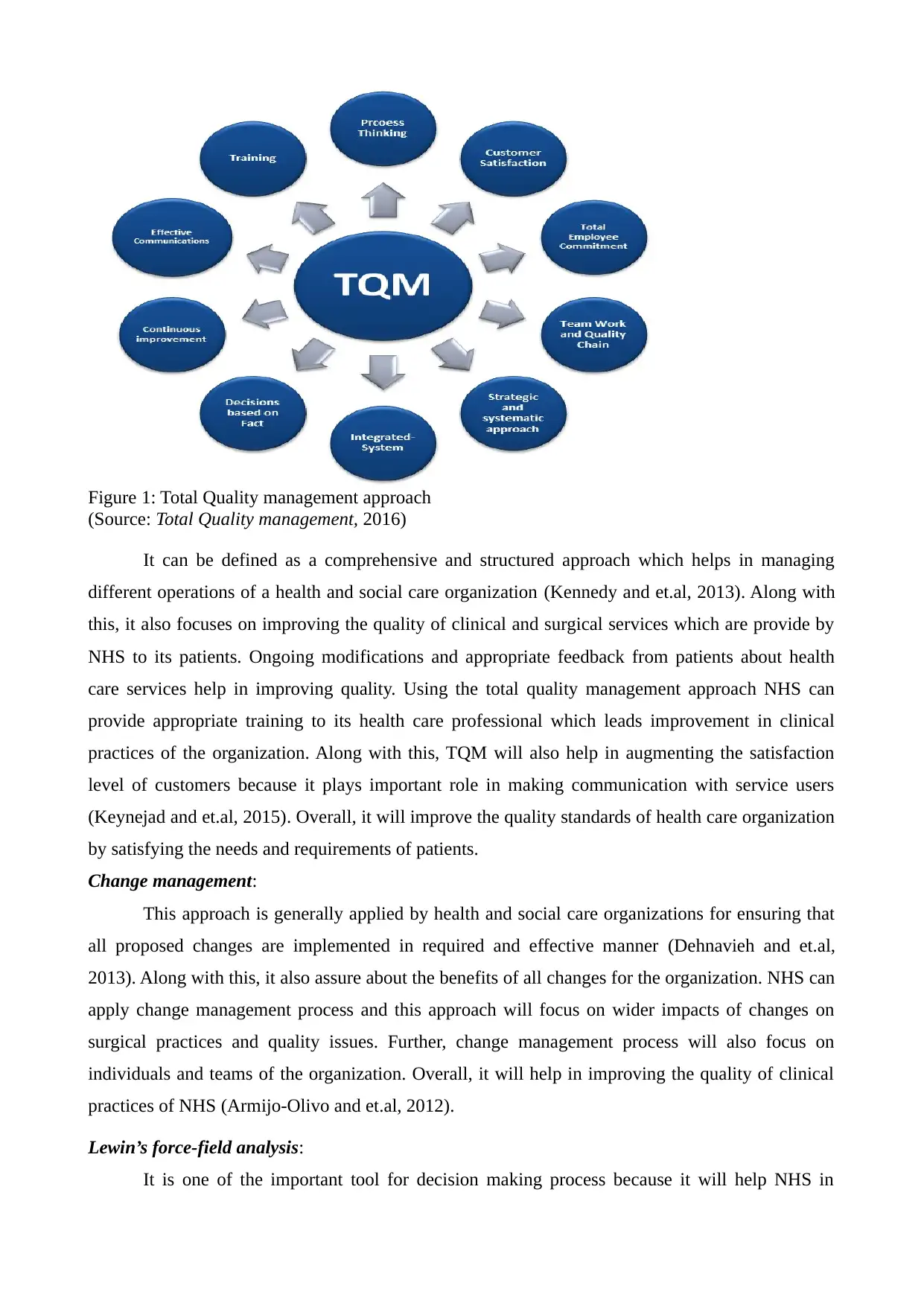
Figure 1: Total Quality management approach
(Source: Total Quality management, 2016)
It can be defined as a comprehensive and structured approach which helps in managing
different operations of a health and social care organization (Kennedy and et.al, 2013). Along with
this, it also focuses on improving the quality of clinical and surgical services which are provide by
NHS to its patients. Ongoing modifications and appropriate feedback from patients about health
care services help in improving quality. Using the total quality management approach NHS can
provide appropriate training to its health care professional which leads improvement in clinical
practices of the organization. Along with this, TQM will also help in augmenting the satisfaction
level of customers because it plays important role in making communication with service users
(Keynejad and et.al, 2015). Overall, it will improve the quality standards of health care organization
by satisfying the needs and requirements of patients.
Change management:
This approach is generally applied by health and social care organizations for ensuring that
all proposed changes are implemented in required and effective manner (Dehnavieh and et.al,
2013). Along with this, it also assure about the benefits of all changes for the organization. NHS can
apply change management process and this approach will focus on wider impacts of changes on
surgical practices and quality issues. Further, change management process will also focus on
individuals and teams of the organization. Overall, it will help in improving the quality of clinical
practices of NHS (Armijo‐Olivo and et.al, 2012).
Lewin’s force-field analysis:
It is one of the important tool for decision making process because it will help NHS in
(Source: Total Quality management, 2016)
It can be defined as a comprehensive and structured approach which helps in managing
different operations of a health and social care organization (Kennedy and et.al, 2013). Along with
this, it also focuses on improving the quality of clinical and surgical services which are provide by
NHS to its patients. Ongoing modifications and appropriate feedback from patients about health
care services help in improving quality. Using the total quality management approach NHS can
provide appropriate training to its health care professional which leads improvement in clinical
practices of the organization. Along with this, TQM will also help in augmenting the satisfaction
level of customers because it plays important role in making communication with service users
(Keynejad and et.al, 2015). Overall, it will improve the quality standards of health care organization
by satisfying the needs and requirements of patients.
Change management:
This approach is generally applied by health and social care organizations for ensuring that
all proposed changes are implemented in required and effective manner (Dehnavieh and et.al,
2013). Along with this, it also assure about the benefits of all changes for the organization. NHS can
apply change management process and this approach will focus on wider impacts of changes on
surgical practices and quality issues. Further, change management process will also focus on
individuals and teams of the organization. Overall, it will help in improving the quality of clinical
practices of NHS (Armijo‐Olivo and et.al, 2012).
Lewin’s force-field analysis:
It is one of the important tool for decision making process because it will help NHS in
Paraphrase This Document
Need a fresh take? Get an instant paraphrase of this document with our AI Paraphraser
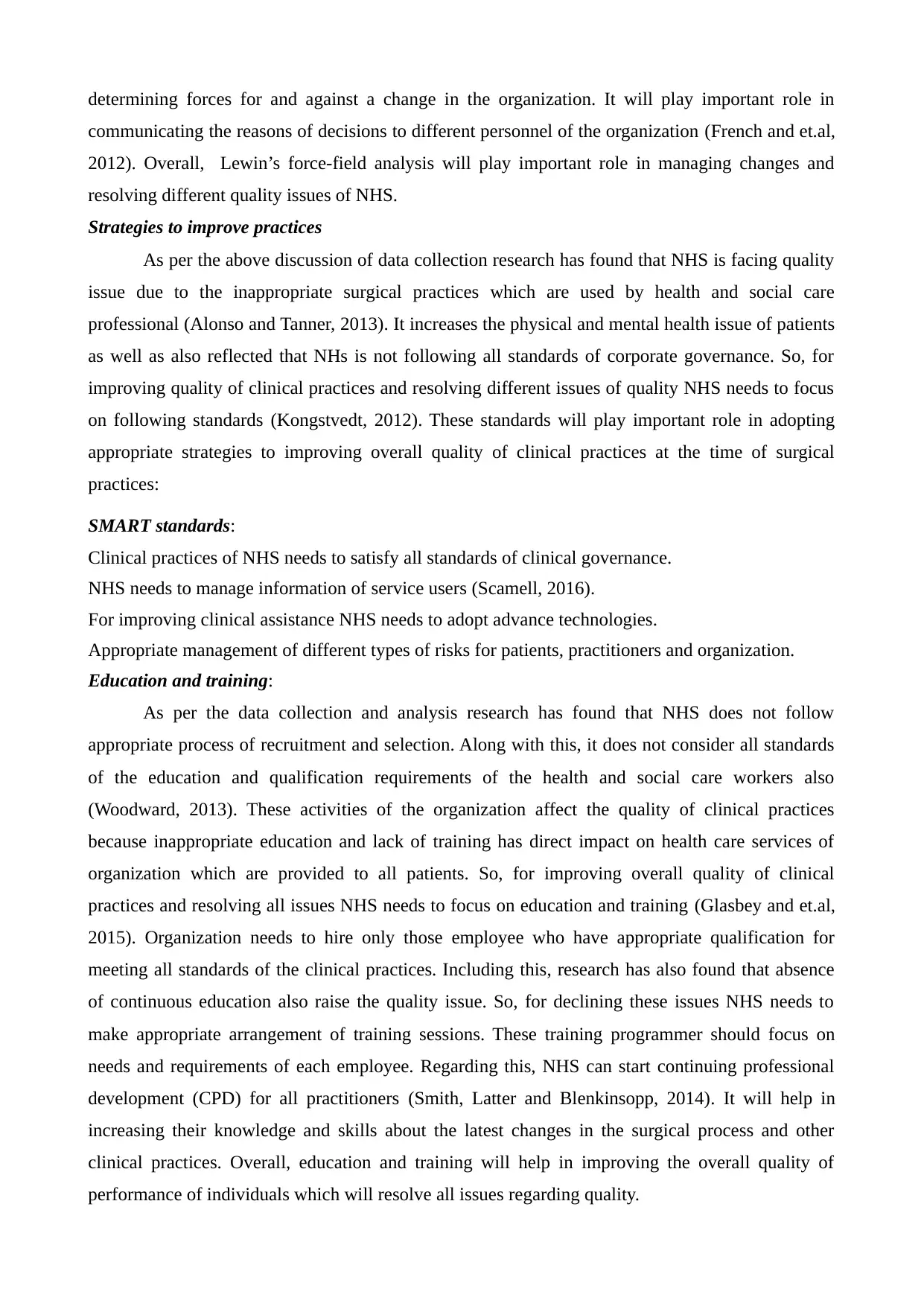
determining forces for and against a change in the organization. It will play important role in
communicating the reasons of decisions to different personnel of the organization (French and et.al,
2012). Overall, Lewin’s force-field analysis will play important role in managing changes and
resolving different quality issues of NHS.
Strategies to improve practices
As per the above discussion of data collection research has found that NHS is facing quality
issue due to the inappropriate surgical practices which are used by health and social care
professional (Alonso and Tanner, 2013). It increases the physical and mental health issue of patients
as well as also reflected that NHs is not following all standards of corporate governance. So, for
improving quality of clinical practices and resolving different issues of quality NHS needs to focus
on following standards (Kongstvedt, 2012). These standards will play important role in adopting
appropriate strategies to improving overall quality of clinical practices at the time of surgical
practices:
SMART standards:
Clinical practices of NHS needs to satisfy all standards of clinical governance.
NHS needs to manage information of service users (Scamell, 2016).
For improving clinical assistance NHS needs to adopt advance technologies.
Appropriate management of different types of risks for patients, practitioners and organization.
Education and training:
As per the data collection and analysis research has found that NHS does not follow
appropriate process of recruitment and selection. Along with this, it does not consider all standards
of the education and qualification requirements of the health and social care workers also
(Woodward, 2013). These activities of the organization affect the quality of clinical practices
because inappropriate education and lack of training has direct impact on health care services of
organization which are provided to all patients. So, for improving overall quality of clinical
practices and resolving all issues NHS needs to focus on education and training (Glasbey and et.al,
2015). Organization needs to hire only those employee who have appropriate qualification for
meeting all standards of the clinical practices. Including this, research has also found that absence
of continuous education also raise the quality issue. So, for declining these issues NHS needs to
make appropriate arrangement of training sessions. These training programmer should focus on
needs and requirements of each employee. Regarding this, NHS can start continuing professional
development (CPD) for all practitioners (Smith, Latter and Blenkinsopp, 2014). It will help in
increasing their knowledge and skills about the latest changes in the surgical process and other
clinical practices. Overall, education and training will help in improving the overall quality of
performance of individuals which will resolve all issues regarding quality.
communicating the reasons of decisions to different personnel of the organization (French and et.al,
2012). Overall, Lewin’s force-field analysis will play important role in managing changes and
resolving different quality issues of NHS.
Strategies to improve practices
As per the above discussion of data collection research has found that NHS is facing quality
issue due to the inappropriate surgical practices which are used by health and social care
professional (Alonso and Tanner, 2013). It increases the physical and mental health issue of patients
as well as also reflected that NHs is not following all standards of corporate governance. So, for
improving quality of clinical practices and resolving different issues of quality NHS needs to focus
on following standards (Kongstvedt, 2012). These standards will play important role in adopting
appropriate strategies to improving overall quality of clinical practices at the time of surgical
practices:
SMART standards:
Clinical practices of NHS needs to satisfy all standards of clinical governance.
NHS needs to manage information of service users (Scamell, 2016).
For improving clinical assistance NHS needs to adopt advance technologies.
Appropriate management of different types of risks for patients, practitioners and organization.
Education and training:
As per the data collection and analysis research has found that NHS does not follow
appropriate process of recruitment and selection. Along with this, it does not consider all standards
of the education and qualification requirements of the health and social care workers also
(Woodward, 2013). These activities of the organization affect the quality of clinical practices
because inappropriate education and lack of training has direct impact on health care services of
organization which are provided to all patients. So, for improving overall quality of clinical
practices and resolving all issues NHS needs to focus on education and training (Glasbey and et.al,
2015). Organization needs to hire only those employee who have appropriate qualification for
meeting all standards of the clinical practices. Including this, research has also found that absence
of continuous education also raise the quality issue. So, for declining these issues NHS needs to
make appropriate arrangement of training sessions. These training programmer should focus on
needs and requirements of each employee. Regarding this, NHS can start continuing professional
development (CPD) for all practitioners (Smith, Latter and Blenkinsopp, 2014). It will help in
increasing their knowledge and skills about the latest changes in the surgical process and other
clinical practices. Overall, education and training will help in improving the overall quality of
performance of individuals which will resolve all issues regarding quality.
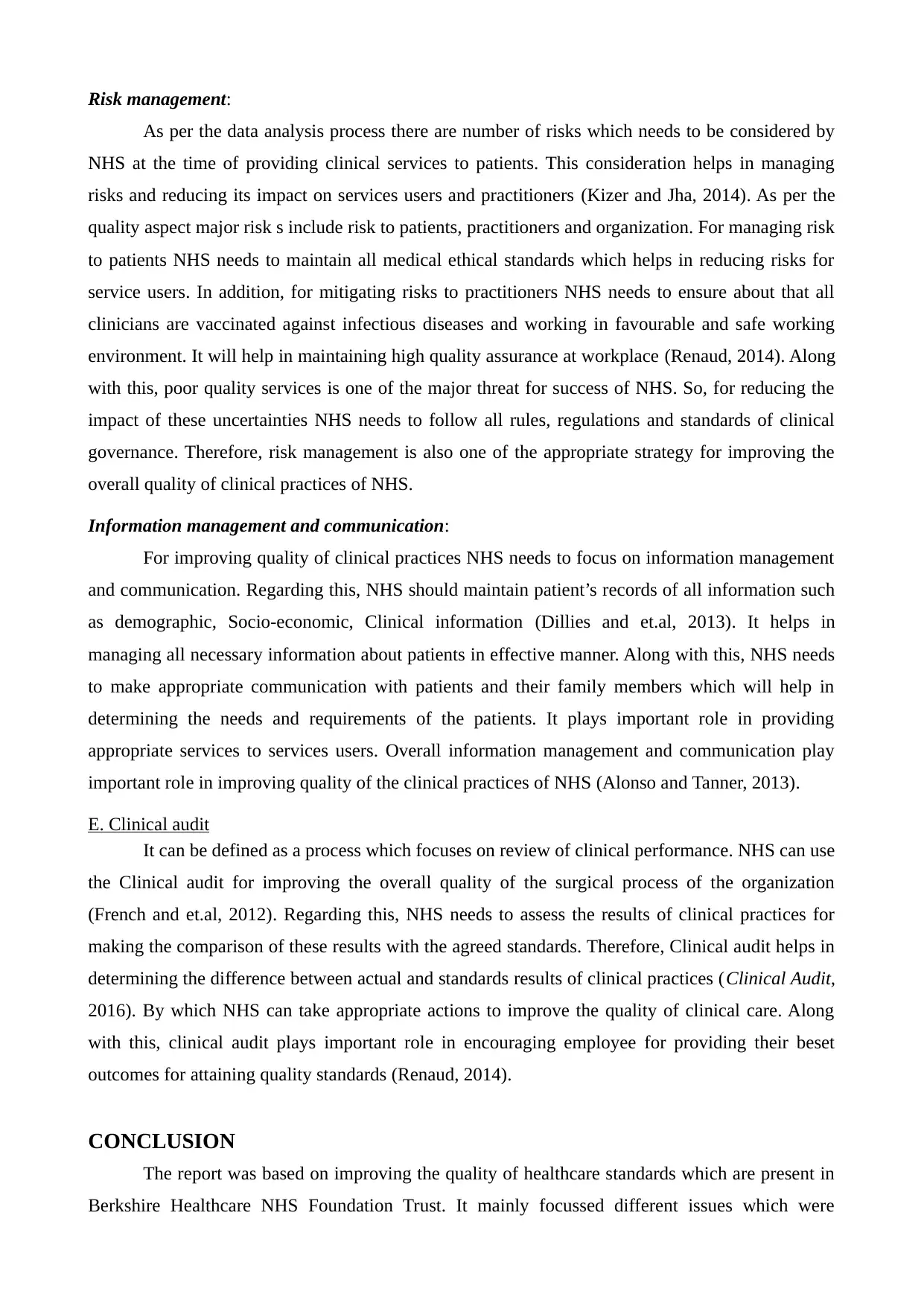
Risk management:
As per the data analysis process there are number of risks which needs to be considered by
NHS at the time of providing clinical services to patients. This consideration helps in managing
risks and reducing its impact on services users and practitioners (Kizer and Jha, 2014). As per the
quality aspect major risk s include risk to patients, practitioners and organization. For managing risk
to patients NHS needs to maintain all medical ethical standards which helps in reducing risks for
service users. In addition, for mitigating risks to practitioners NHS needs to ensure about that all
clinicians are vaccinated against infectious diseases and working in favourable and safe working
environment. It will help in maintaining high quality assurance at workplace (Renaud, 2014). Along
with this, poor quality services is one of the major threat for success of NHS. So, for reducing the
impact of these uncertainties NHS needs to follow all rules, regulations and standards of clinical
governance. Therefore, risk management is also one of the appropriate strategy for improving the
overall quality of clinical practices of NHS.
Information management and communication:
For improving quality of clinical practices NHS needs to focus on information management
and communication. Regarding this, NHS should maintain patient’s records of all information such
as demographic, Socio-economic, Clinical information (Dillies and et.al, 2013). It helps in
managing all necessary information about patients in effective manner. Along with this, NHS needs
to make appropriate communication with patients and their family members which will help in
determining the needs and requirements of the patients. It plays important role in providing
appropriate services to services users. Overall information management and communication play
important role in improving quality of the clinical practices of NHS (Alonso and Tanner, 2013).
E. Clinical audit
It can be defined as a process which focuses on review of clinical performance. NHS can use
the Clinical audit for improving the overall quality of the surgical process of the organization
(French and et.al, 2012). Regarding this, NHS needs to assess the results of clinical practices for
making the comparison of these results with the agreed standards. Therefore, Clinical audit helps in
determining the difference between actual and standards results of clinical practices (Clinical Audit,
2016). By which NHS can take appropriate actions to improve the quality of clinical care. Along
with this, clinical audit plays important role in encouraging employee for providing their beset
outcomes for attaining quality standards (Renaud, 2014).
CONCLUSION
The report was based on improving the quality of healthcare standards which are present in
Berkshire Healthcare NHS Foundation Trust. It mainly focussed different issues which were
As per the data analysis process there are number of risks which needs to be considered by
NHS at the time of providing clinical services to patients. This consideration helps in managing
risks and reducing its impact on services users and practitioners (Kizer and Jha, 2014). As per the
quality aspect major risk s include risk to patients, practitioners and organization. For managing risk
to patients NHS needs to maintain all medical ethical standards which helps in reducing risks for
service users. In addition, for mitigating risks to practitioners NHS needs to ensure about that all
clinicians are vaccinated against infectious diseases and working in favourable and safe working
environment. It will help in maintaining high quality assurance at workplace (Renaud, 2014). Along
with this, poor quality services is one of the major threat for success of NHS. So, for reducing the
impact of these uncertainties NHS needs to follow all rules, regulations and standards of clinical
governance. Therefore, risk management is also one of the appropriate strategy for improving the
overall quality of clinical practices of NHS.
Information management and communication:
For improving quality of clinical practices NHS needs to focus on information management
and communication. Regarding this, NHS should maintain patient’s records of all information such
as demographic, Socio-economic, Clinical information (Dillies and et.al, 2013). It helps in
managing all necessary information about patients in effective manner. Along with this, NHS needs
to make appropriate communication with patients and their family members which will help in
determining the needs and requirements of the patients. It plays important role in providing
appropriate services to services users. Overall information management and communication play
important role in improving quality of the clinical practices of NHS (Alonso and Tanner, 2013).
E. Clinical audit
It can be defined as a process which focuses on review of clinical performance. NHS can use
the Clinical audit for improving the overall quality of the surgical process of the organization
(French and et.al, 2012). Regarding this, NHS needs to assess the results of clinical practices for
making the comparison of these results with the agreed standards. Therefore, Clinical audit helps in
determining the difference between actual and standards results of clinical practices (Clinical Audit,
2016). By which NHS can take appropriate actions to improve the quality of clinical care. Along
with this, clinical audit plays important role in encouraging employee for providing their beset
outcomes for attaining quality standards (Renaud, 2014).
CONCLUSION
The report was based on improving the quality of healthcare standards which are present in
Berkshire Healthcare NHS Foundation Trust. It mainly focussed different issues which were
⊘ This is a preview!⊘
Do you want full access?
Subscribe today to unlock all pages.

Trusted by 1+ million students worldwide
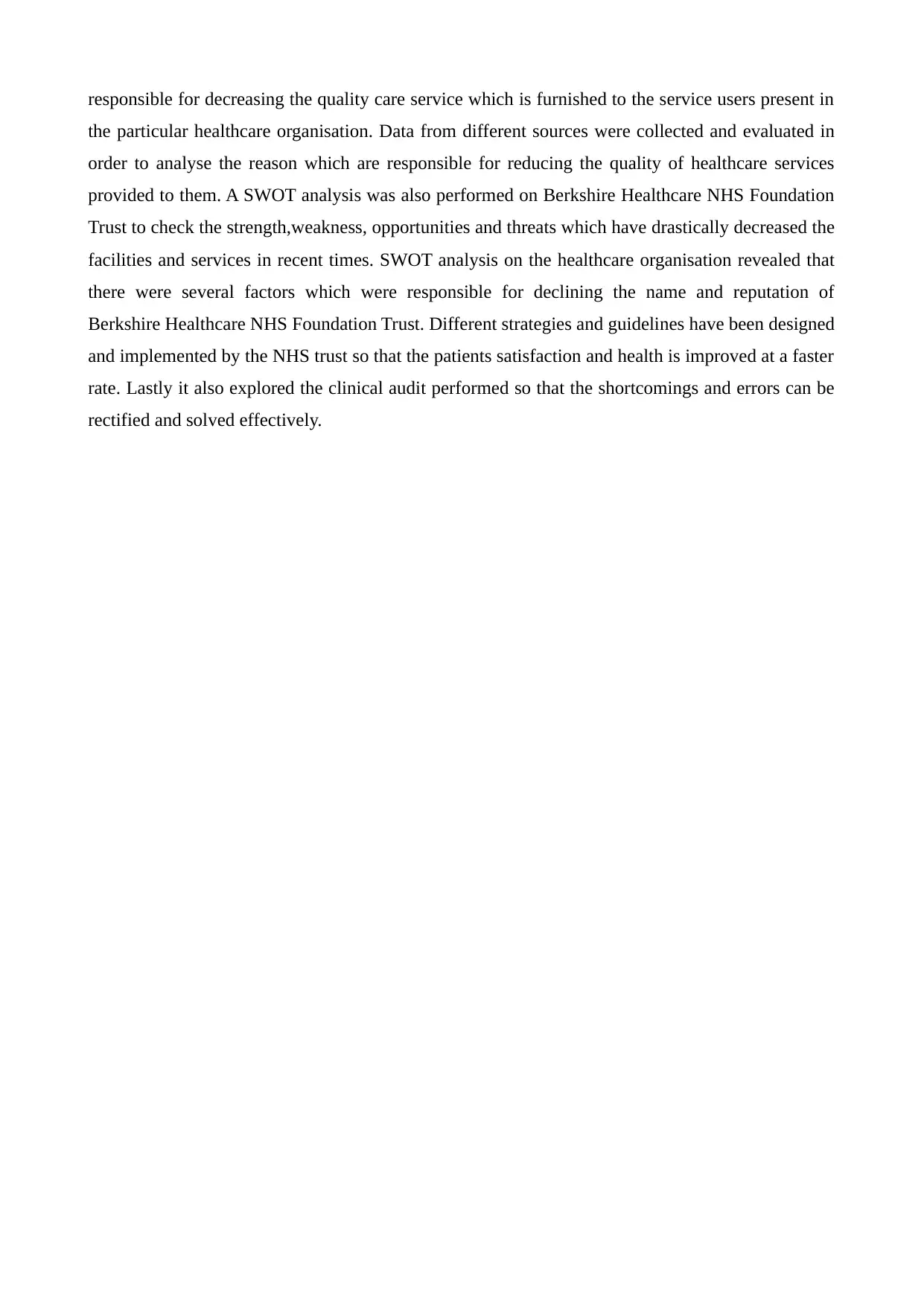
responsible for decreasing the quality care service which is furnished to the service users present in
the particular healthcare organisation. Data from different sources were collected and evaluated in
order to analyse the reason which are responsible for reducing the quality of healthcare services
provided to them. A SWOT analysis was also performed on Berkshire Healthcare NHS Foundation
Trust to check the strength,weakness, opportunities and threats which have drastically decreased the
facilities and services in recent times. SWOT analysis on the healthcare organisation revealed that
there were several factors which were responsible for declining the name and reputation of
Berkshire Healthcare NHS Foundation Trust. Different strategies and guidelines have been designed
and implemented by the NHS trust so that the patients satisfaction and health is improved at a faster
rate. Lastly it also explored the clinical audit performed so that the shortcomings and errors can be
rectified and solved effectively.
the particular healthcare organisation. Data from different sources were collected and evaluated in
order to analyse the reason which are responsible for reducing the quality of healthcare services
provided to them. A SWOT analysis was also performed on Berkshire Healthcare NHS Foundation
Trust to check the strength,weakness, opportunities and threats which have drastically decreased the
facilities and services in recent times. SWOT analysis on the healthcare organisation revealed that
there were several factors which were responsible for declining the name and reputation of
Berkshire Healthcare NHS Foundation Trust. Different strategies and guidelines have been designed
and implemented by the NHS trust so that the patients satisfaction and health is improved at a faster
rate. Lastly it also explored the clinical audit performed so that the shortcomings and errors can be
rectified and solved effectively.
Paraphrase This Document
Need a fresh take? Get an instant paraphrase of this document with our AI Paraphraser
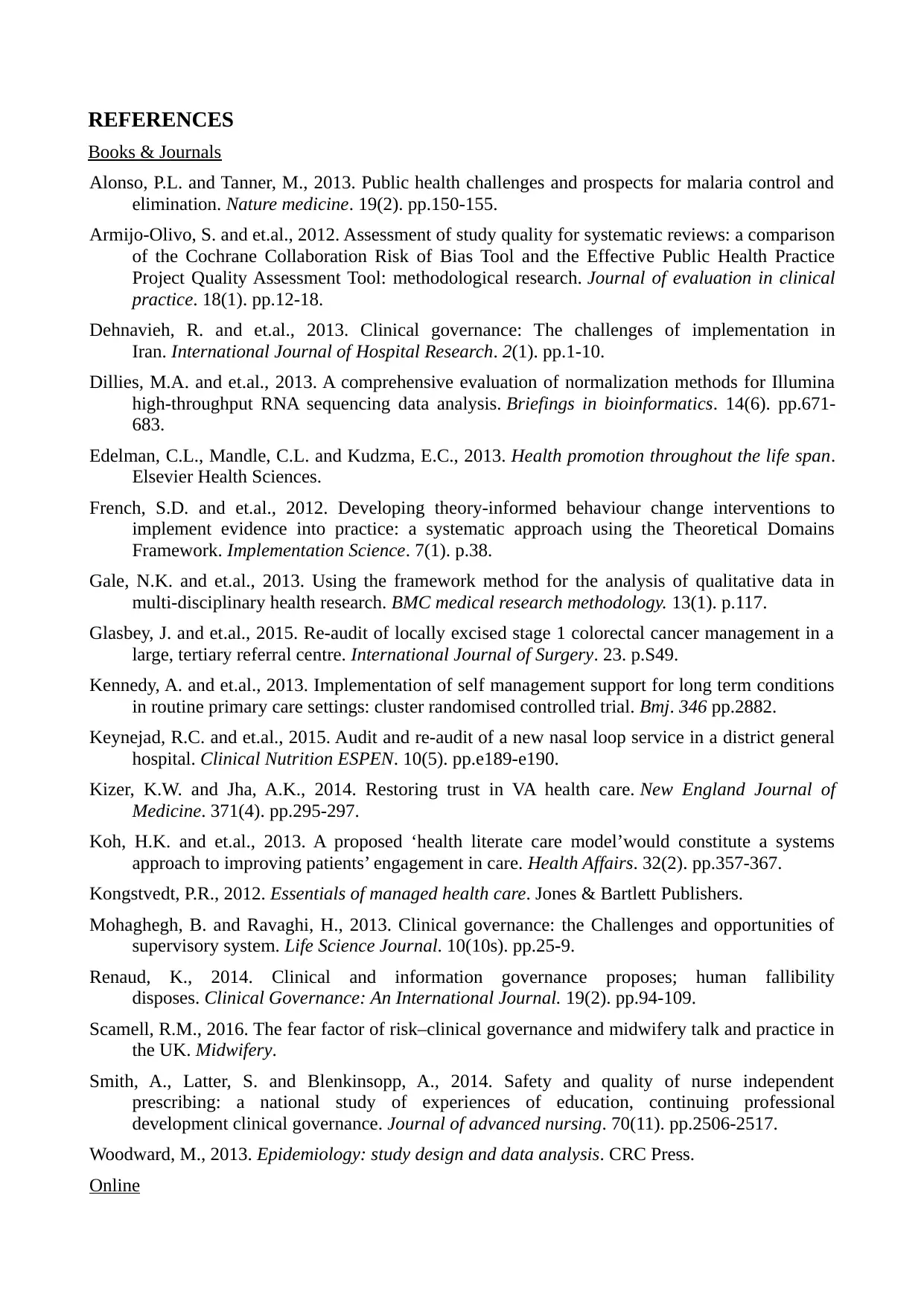
REFERENCES
Books & Journals
Alonso, P.L. and Tanner, M., 2013. Public health challenges and prospects for malaria control and
elimination. Nature medicine. 19(2). pp.150-155.
Armijo‐Olivo, S. and et.al., 2012. Assessment of study quality for systematic reviews: a comparison
of the Cochrane Collaboration Risk of Bias Tool and the Effective Public Health Practice
Project Quality Assessment Tool: methodological research. Journal of evaluation in clinical
practice. 18(1). pp.12-18.
Dehnavieh, R. and et.al., 2013. Clinical governance: The challenges of implementation in
Iran. International Journal of Hospital Research. 2(1). pp.1-10.
Dillies, M.A. and et.al., 2013. A comprehensive evaluation of normalization methods for Illumina
high-throughput RNA sequencing data analysis. Briefings in bioinformatics. 14(6). pp.671-
683.
Edelman, C.L., Mandle, C.L. and Kudzma, E.C., 2013. Health promotion throughout the life span.
Elsevier Health Sciences.
French, S.D. and et.al., 2012. Developing theory-informed behaviour change interventions to
implement evidence into practice: a systematic approach using the Theoretical Domains
Framework. Implementation Science. 7(1). p.38.
Gale, N.K. and et.al., 2013. Using the framework method for the analysis of qualitative data in
multi-disciplinary health research. BMC medical research methodology. 13(1). p.117.
Glasbey, J. and et.al., 2015. Re-audit of locally excised stage 1 colorectal cancer management in a
large, tertiary referral centre. International Journal of Surgery. 23. p.S49.
Kennedy, A. and et.al., 2013. Implementation of self management support for long term conditions
in routine primary care settings: cluster randomised controlled trial. Bmj. 346 pp.2882.
Keynejad, R.C. and et.al., 2015. Audit and re-audit of a new nasal loop service in a district general
hospital. Clinical Nutrition ESPEN. 10(5). pp.e189-e190.
Kizer, K.W. and Jha, A.K., 2014. Restoring trust in VA health care. New England Journal of
Medicine. 371(4). pp.295-297.
Koh, H.K. and et.al., 2013. A proposed ‘health literate care model’would constitute a systems
approach to improving patients’ engagement in care. Health Affairs. 32(2). pp.357-367.
Kongstvedt, P.R., 2012. Essentials of managed health care. Jones & Bartlett Publishers.
Mohaghegh, B. and Ravaghi, H., 2013. Clinical governance: the Challenges and opportunities of
supervisory system. Life Science Journal. 10(10s). pp.25-9.
Renaud, K., 2014. Clinical and information governance proposes; human fallibility
disposes. Clinical Governance: An International Journal. 19(2). pp.94-109.
Scamell, R.M., 2016. The fear factor of risk–clinical governance and midwifery talk and practice in
the UK. Midwifery.
Smith, A., Latter, S. and Blenkinsopp, A., 2014. Safety and quality of nurse independent
prescribing: a national study of experiences of education, continuing professional
development clinical governance. Journal of advanced nursing. 70(11). pp.2506-2517.
Woodward, M., 2013. Epidemiology: study design and data analysis. CRC Press.
Online
Books & Journals
Alonso, P.L. and Tanner, M., 2013. Public health challenges and prospects for malaria control and
elimination. Nature medicine. 19(2). pp.150-155.
Armijo‐Olivo, S. and et.al., 2012. Assessment of study quality for systematic reviews: a comparison
of the Cochrane Collaboration Risk of Bias Tool and the Effective Public Health Practice
Project Quality Assessment Tool: methodological research. Journal of evaluation in clinical
practice. 18(1). pp.12-18.
Dehnavieh, R. and et.al., 2013. Clinical governance: The challenges of implementation in
Iran. International Journal of Hospital Research. 2(1). pp.1-10.
Dillies, M.A. and et.al., 2013. A comprehensive evaluation of normalization methods for Illumina
high-throughput RNA sequencing data analysis. Briefings in bioinformatics. 14(6). pp.671-
683.
Edelman, C.L., Mandle, C.L. and Kudzma, E.C., 2013. Health promotion throughout the life span.
Elsevier Health Sciences.
French, S.D. and et.al., 2012. Developing theory-informed behaviour change interventions to
implement evidence into practice: a systematic approach using the Theoretical Domains
Framework. Implementation Science. 7(1). p.38.
Gale, N.K. and et.al., 2013. Using the framework method for the analysis of qualitative data in
multi-disciplinary health research. BMC medical research methodology. 13(1). p.117.
Glasbey, J. and et.al., 2015. Re-audit of locally excised stage 1 colorectal cancer management in a
large, tertiary referral centre. International Journal of Surgery. 23. p.S49.
Kennedy, A. and et.al., 2013. Implementation of self management support for long term conditions
in routine primary care settings: cluster randomised controlled trial. Bmj. 346 pp.2882.
Keynejad, R.C. and et.al., 2015. Audit and re-audit of a new nasal loop service in a district general
hospital. Clinical Nutrition ESPEN. 10(5). pp.e189-e190.
Kizer, K.W. and Jha, A.K., 2014. Restoring trust in VA health care. New England Journal of
Medicine. 371(4). pp.295-297.
Koh, H.K. and et.al., 2013. A proposed ‘health literate care model’would constitute a systems
approach to improving patients’ engagement in care. Health Affairs. 32(2). pp.357-367.
Kongstvedt, P.R., 2012. Essentials of managed health care. Jones & Bartlett Publishers.
Mohaghegh, B. and Ravaghi, H., 2013. Clinical governance: the Challenges and opportunities of
supervisory system. Life Science Journal. 10(10s). pp.25-9.
Renaud, K., 2014. Clinical and information governance proposes; human fallibility
disposes. Clinical Governance: An International Journal. 19(2). pp.94-109.
Scamell, R.M., 2016. The fear factor of risk–clinical governance and midwifery talk and practice in
the UK. Midwifery.
Smith, A., Latter, S. and Blenkinsopp, A., 2014. Safety and quality of nurse independent
prescribing: a national study of experiences of education, continuing professional
development clinical governance. Journal of advanced nursing. 70(11). pp.2506-2517.
Woodward, M., 2013. Epidemiology: study design and data analysis. CRC Press.
Online
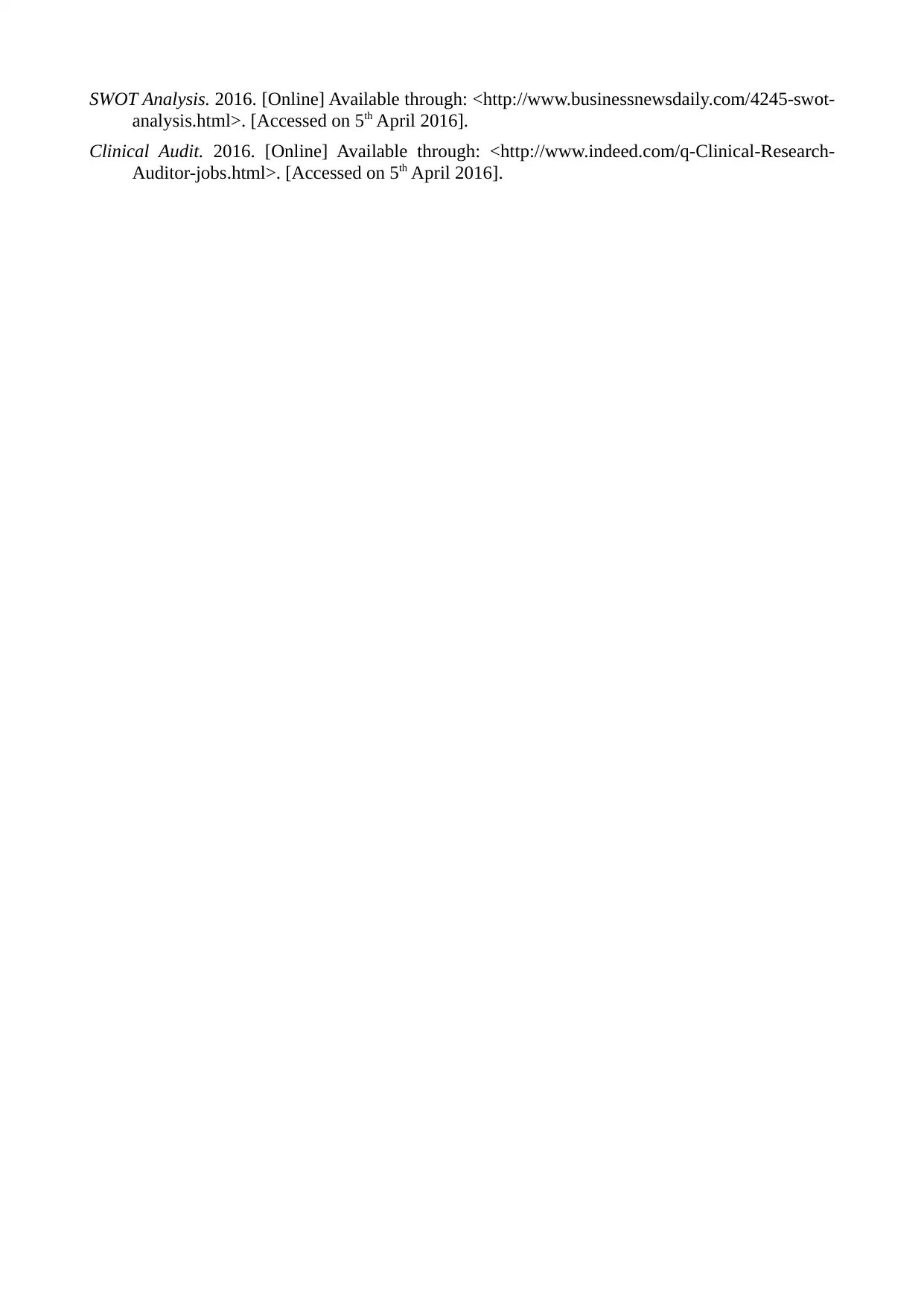
SWOT Analysis. 2016. [Online] Available through: <http://www.businessnewsdaily.com/4245-swot-
analysis.html>. [Accessed on 5th April 2016].
Clinical Audit. 2016. [Online] Available through: <http://www.indeed.com/q-Clinical-Research-
Auditor-jobs.html>. [Accessed on 5th April 2016].
analysis.html>. [Accessed on 5th April 2016].
Clinical Audit. 2016. [Online] Available through: <http://www.indeed.com/q-Clinical-Research-
Auditor-jobs.html>. [Accessed on 5th April 2016].
⊘ This is a preview!⊘
Do you want full access?
Subscribe today to unlock all pages.

Trusted by 1+ million students worldwide
1 out of 12
Related Documents
Your All-in-One AI-Powered Toolkit for Academic Success.
+13062052269
info@desklib.com
Available 24*7 on WhatsApp / Email
![[object Object]](/_next/static/media/star-bottom.7253800d.svg)
Unlock your academic potential
Copyright © 2020–2026 A2Z Services. All Rights Reserved. Developed and managed by ZUCOL.





